Economics Assignment: Incoterms, Risk, and Global Trade Dynamics
VerifiedAdded on 2022/10/10
|5
|1082
|153
Homework Assignment
AI Summary
This economics assignment delves into the crucial role of Incoterms in international trade. It begins by defining Incoterms as standardized rules established by the International Chamber of Commerce (ICC) to govern international business transactions. The assignment highlights how Incoterms mitigate risks for both importers and exporters by clarifying responsibilities, costs, and liabilities. It also identifies aspects of international trade not addressed by Incoterms, such as contract breaches and employee transfers, emphasizing the need for separate agreements. The assignment further categorizes Incoterms into two main divisions: all transport modes and sea & inland waterways, providing examples of specific rules within each category, such as EXW, FCA, FAS, and FOB. By exploring these aspects, the assignment offers a comprehensive understanding of Incoterms and their impact on the global trade landscape.
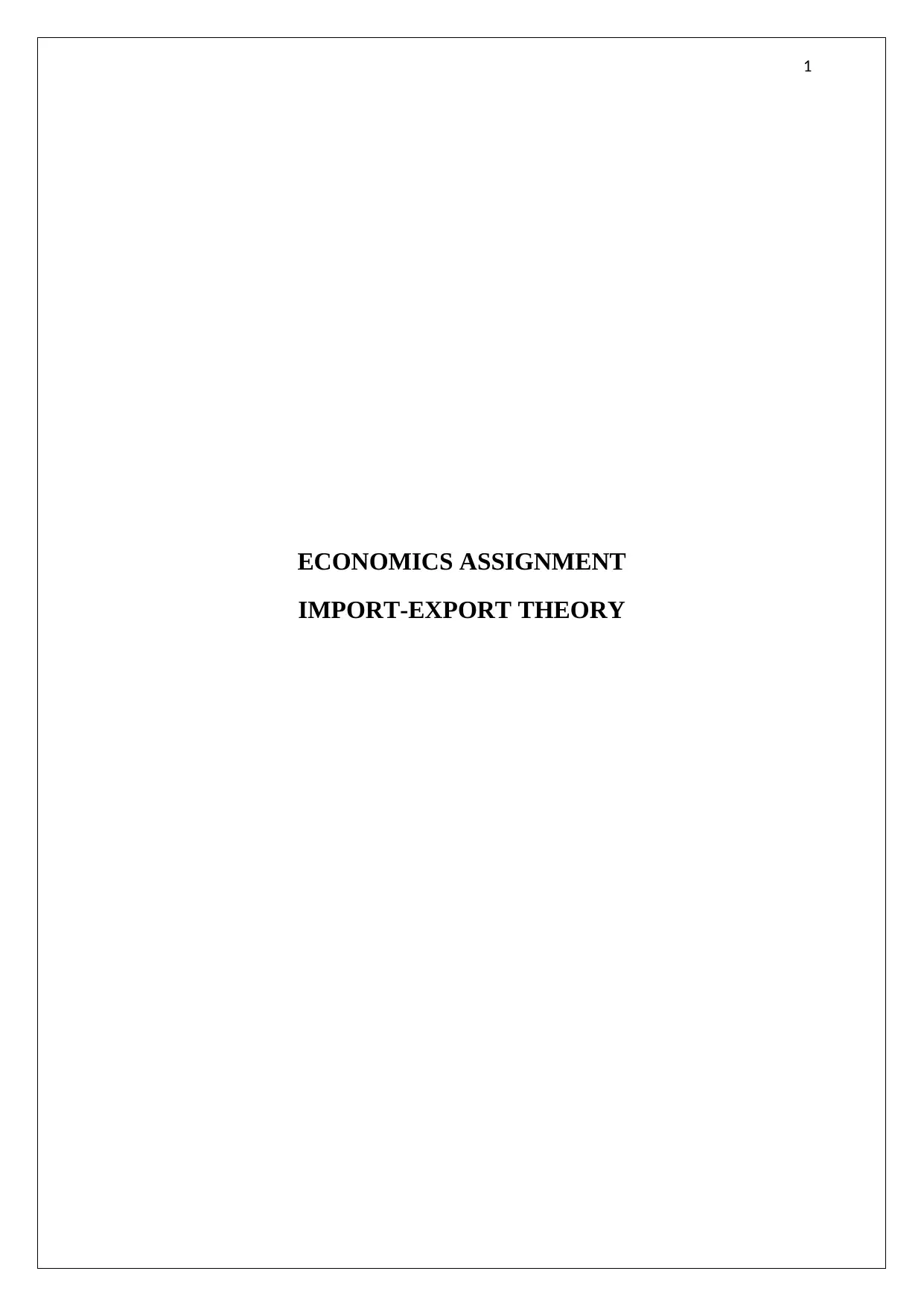
1
ECONOMICS ASSIGNMENT
IMPORT-EXPORT THEORY
ECONOMICS ASSIGNMENT
IMPORT-EXPORT THEORY
Paraphrase This Document
Need a fresh take? Get an instant paraphrase of this document with our AI Paraphraser
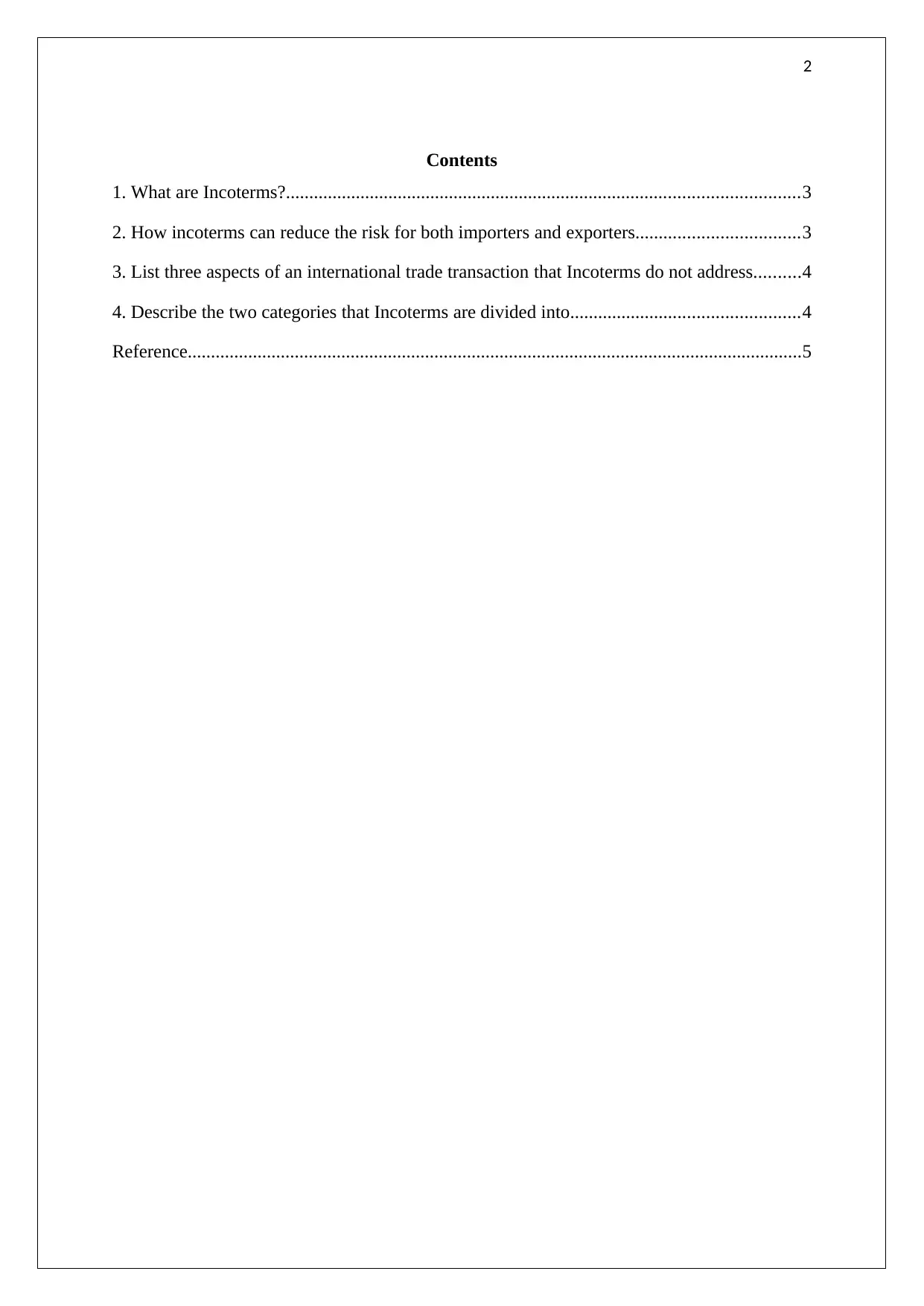
2
Contents
1. What are Incoterms?..............................................................................................................3
2. How incoterms can reduce the risk for both importers and exporters...................................3
3. List three aspects of an international trade transaction that Incoterms do not address..........4
4. Describe the two categories that Incoterms are divided into.................................................4
Reference....................................................................................................................................5
Contents
1. What are Incoterms?..............................................................................................................3
2. How incoterms can reduce the risk for both importers and exporters...................................3
3. List three aspects of an international trade transaction that Incoterms do not address..........4
4. Describe the two categories that Incoterms are divided into.................................................4
Reference....................................................................................................................................5
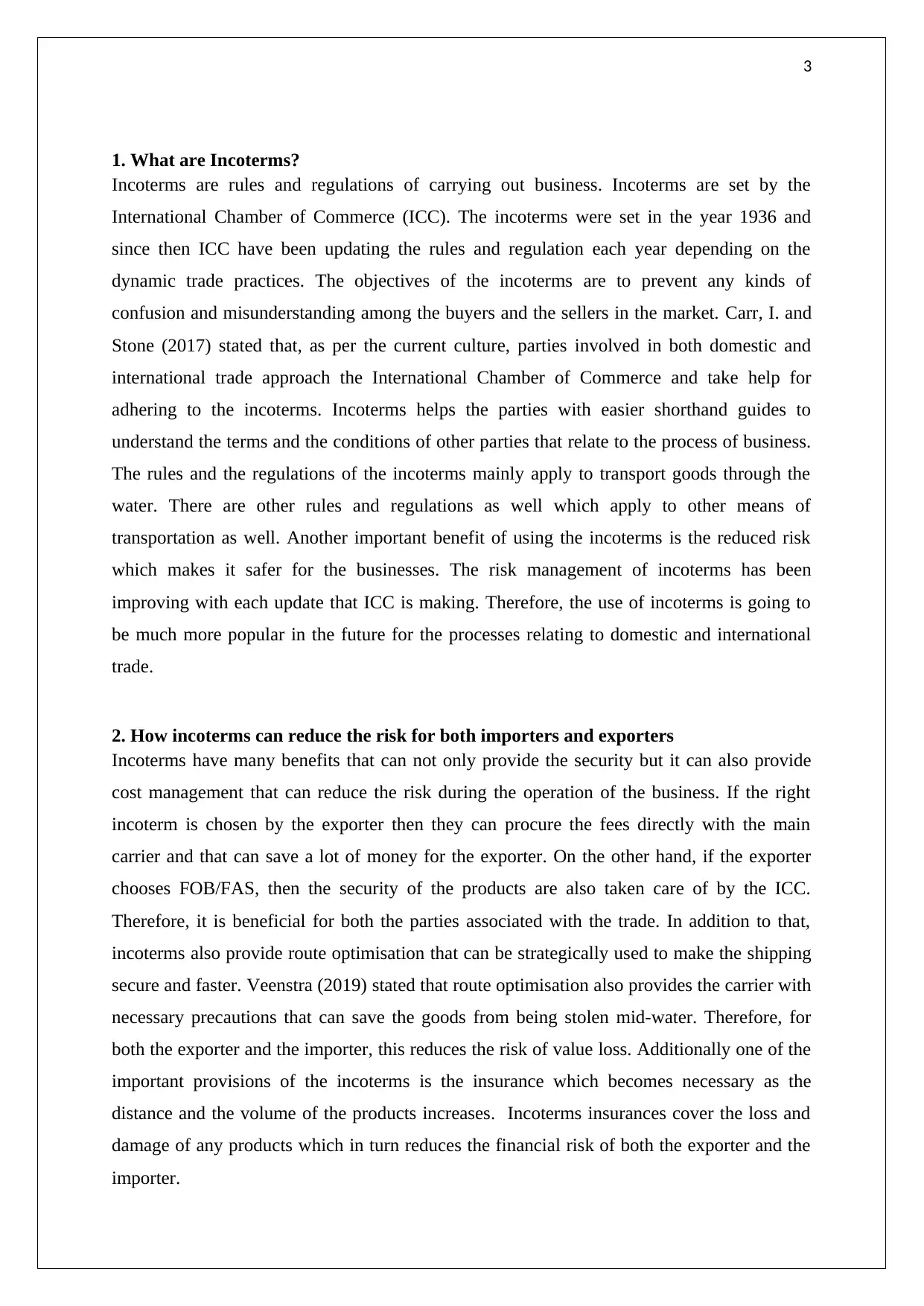
3
1. What are Incoterms?
Incoterms are rules and regulations of carrying out business. Incoterms are set by the
International Chamber of Commerce (ICC). The incoterms were set in the year 1936 and
since then ICC have been updating the rules and regulation each year depending on the
dynamic trade practices. The objectives of the incoterms are to prevent any kinds of
confusion and misunderstanding among the buyers and the sellers in the market. Carr, I. and
Stone (2017) stated that, as per the current culture, parties involved in both domestic and
international trade approach the International Chamber of Commerce and take help for
adhering to the incoterms. Incoterms helps the parties with easier shorthand guides to
understand the terms and the conditions of other parties that relate to the process of business.
The rules and the regulations of the incoterms mainly apply to transport goods through the
water. There are other rules and regulations as well which apply to other means of
transportation as well. Another important benefit of using the incoterms is the reduced risk
which makes it safer for the businesses. The risk management of incoterms has been
improving with each update that ICC is making. Therefore, the use of incoterms is going to
be much more popular in the future for the processes relating to domestic and international
trade.
2. How incoterms can reduce the risk for both importers and exporters
Incoterms have many benefits that can not only provide the security but it can also provide
cost management that can reduce the risk during the operation of the business. If the right
incoterm is chosen by the exporter then they can procure the fees directly with the main
carrier and that can save a lot of money for the exporter. On the other hand, if the exporter
chooses FOB/FAS, then the security of the products are also taken care of by the ICC.
Therefore, it is beneficial for both the parties associated with the trade. In addition to that,
incoterms also provide route optimisation that can be strategically used to make the shipping
secure and faster. Veenstra (2019) stated that route optimisation also provides the carrier with
necessary precautions that can save the goods from being stolen mid-water. Therefore, for
both the exporter and the importer, this reduces the risk of value loss. Additionally one of the
important provisions of the incoterms is the insurance which becomes necessary as the
distance and the volume of the products increases. Incoterms insurances cover the loss and
damage of any products which in turn reduces the financial risk of both the exporter and the
importer.
1. What are Incoterms?
Incoterms are rules and regulations of carrying out business. Incoterms are set by the
International Chamber of Commerce (ICC). The incoterms were set in the year 1936 and
since then ICC have been updating the rules and regulation each year depending on the
dynamic trade practices. The objectives of the incoterms are to prevent any kinds of
confusion and misunderstanding among the buyers and the sellers in the market. Carr, I. and
Stone (2017) stated that, as per the current culture, parties involved in both domestic and
international trade approach the International Chamber of Commerce and take help for
adhering to the incoterms. Incoterms helps the parties with easier shorthand guides to
understand the terms and the conditions of other parties that relate to the process of business.
The rules and the regulations of the incoterms mainly apply to transport goods through the
water. There are other rules and regulations as well which apply to other means of
transportation as well. Another important benefit of using the incoterms is the reduced risk
which makes it safer for the businesses. The risk management of incoterms has been
improving with each update that ICC is making. Therefore, the use of incoterms is going to
be much more popular in the future for the processes relating to domestic and international
trade.
2. How incoterms can reduce the risk for both importers and exporters
Incoterms have many benefits that can not only provide the security but it can also provide
cost management that can reduce the risk during the operation of the business. If the right
incoterm is chosen by the exporter then they can procure the fees directly with the main
carrier and that can save a lot of money for the exporter. On the other hand, if the exporter
chooses FOB/FAS, then the security of the products are also taken care of by the ICC.
Therefore, it is beneficial for both the parties associated with the trade. In addition to that,
incoterms also provide route optimisation that can be strategically used to make the shipping
secure and faster. Veenstra (2019) stated that route optimisation also provides the carrier with
necessary precautions that can save the goods from being stolen mid-water. Therefore, for
both the exporter and the importer, this reduces the risk of value loss. Additionally one of the
important provisions of the incoterms is the insurance which becomes necessary as the
distance and the volume of the products increases. Incoterms insurances cover the loss and
damage of any products which in turn reduces the financial risk of both the exporter and the
importer.
⊘ This is a preview!⊘
Do you want full access?
Subscribe today to unlock all pages.

Trusted by 1+ million students worldwide
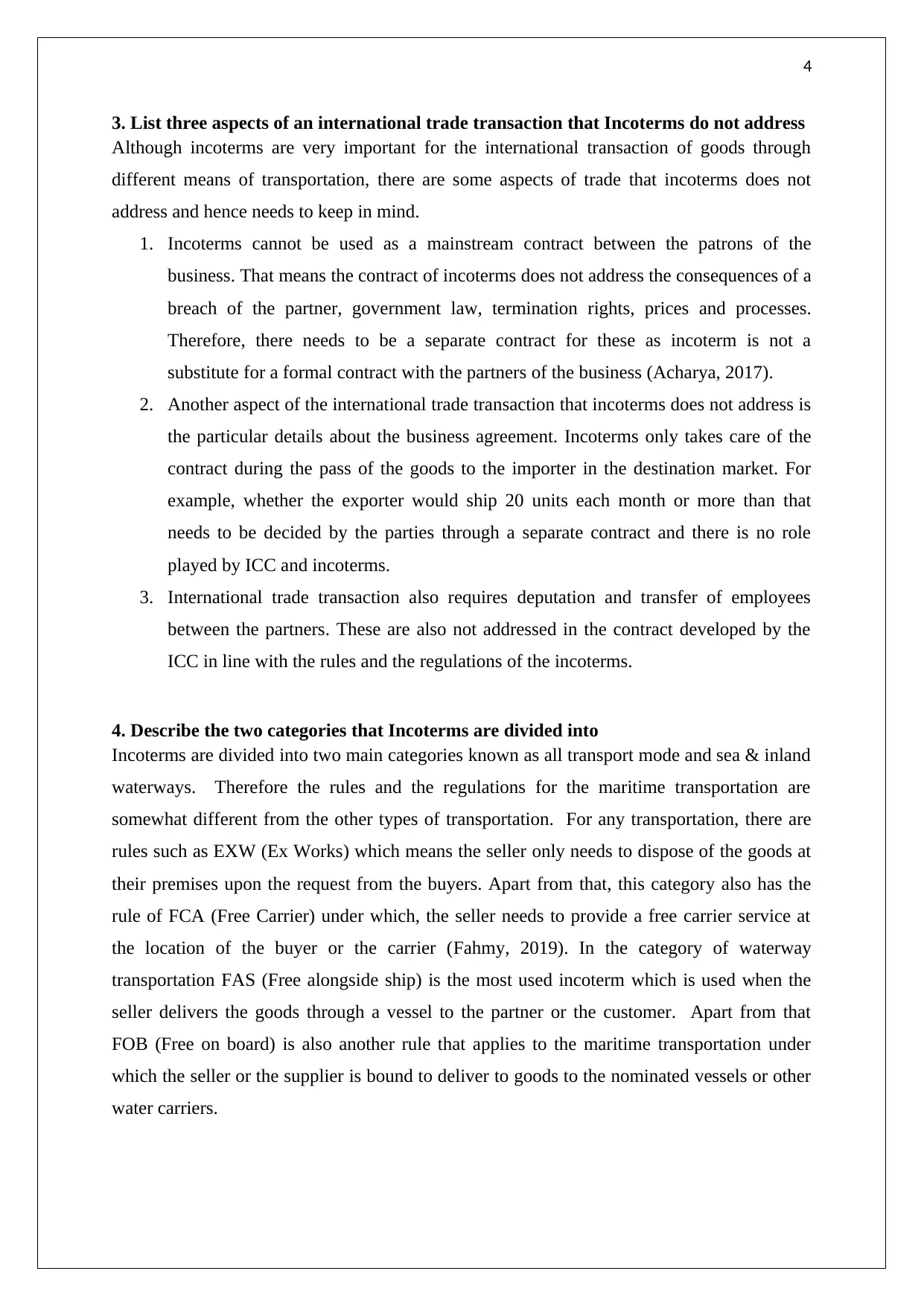
4
3. List three aspects of an international trade transaction that Incoterms do not address
Although incoterms are very important for the international transaction of goods through
different means of transportation, there are some aspects of trade that incoterms does not
address and hence needs to keep in mind.
1. Incoterms cannot be used as a mainstream contract between the patrons of the
business. That means the contract of incoterms does not address the consequences of a
breach of the partner, government law, termination rights, prices and processes.
Therefore, there needs to be a separate contract for these as incoterm is not a
substitute for a formal contract with the partners of the business (Acharya, 2017).
2. Another aspect of the international trade transaction that incoterms does not address is
the particular details about the business agreement. Incoterms only takes care of the
contract during the pass of the goods to the importer in the destination market. For
example, whether the exporter would ship 20 units each month or more than that
needs to be decided by the parties through a separate contract and there is no role
played by ICC and incoterms.
3. International trade transaction also requires deputation and transfer of employees
between the partners. These are also not addressed in the contract developed by the
ICC in line with the rules and the regulations of the incoterms.
4. Describe the two categories that Incoterms are divided into
Incoterms are divided into two main categories known as all transport mode and sea & inland
waterways. Therefore the rules and the regulations for the maritime transportation are
somewhat different from the other types of transportation. For any transportation, there are
rules such as EXW (Ex Works) which means the seller only needs to dispose of the goods at
their premises upon the request from the buyers. Apart from that, this category also has the
rule of FCA (Free Carrier) under which, the seller needs to provide a free carrier service at
the location of the buyer or the carrier (Fahmy, 2019). In the category of waterway
transportation FAS (Free alongside ship) is the most used incoterm which is used when the
seller delivers the goods through a vessel to the partner or the customer. Apart from that
FOB (Free on board) is also another rule that applies to the maritime transportation under
which the seller or the supplier is bound to deliver to goods to the nominated vessels or other
water carriers.
3. List three aspects of an international trade transaction that Incoterms do not address
Although incoterms are very important for the international transaction of goods through
different means of transportation, there are some aspects of trade that incoterms does not
address and hence needs to keep in mind.
1. Incoterms cannot be used as a mainstream contract between the patrons of the
business. That means the contract of incoterms does not address the consequences of a
breach of the partner, government law, termination rights, prices and processes.
Therefore, there needs to be a separate contract for these as incoterm is not a
substitute for a formal contract with the partners of the business (Acharya, 2017).
2. Another aspect of the international trade transaction that incoterms does not address is
the particular details about the business agreement. Incoterms only takes care of the
contract during the pass of the goods to the importer in the destination market. For
example, whether the exporter would ship 20 units each month or more than that
needs to be decided by the parties through a separate contract and there is no role
played by ICC and incoterms.
3. International trade transaction also requires deputation and transfer of employees
between the partners. These are also not addressed in the contract developed by the
ICC in line with the rules and the regulations of the incoterms.
4. Describe the two categories that Incoterms are divided into
Incoterms are divided into two main categories known as all transport mode and sea & inland
waterways. Therefore the rules and the regulations for the maritime transportation are
somewhat different from the other types of transportation. For any transportation, there are
rules such as EXW (Ex Works) which means the seller only needs to dispose of the goods at
their premises upon the request from the buyers. Apart from that, this category also has the
rule of FCA (Free Carrier) under which, the seller needs to provide a free carrier service at
the location of the buyer or the carrier (Fahmy, 2019). In the category of waterway
transportation FAS (Free alongside ship) is the most used incoterm which is used when the
seller delivers the goods through a vessel to the partner or the customer. Apart from that
FOB (Free on board) is also another rule that applies to the maritime transportation under
which the seller or the supplier is bound to deliver to goods to the nominated vessels or other
water carriers.
Paraphrase This Document
Need a fresh take? Get an instant paraphrase of this document with our AI Paraphraser
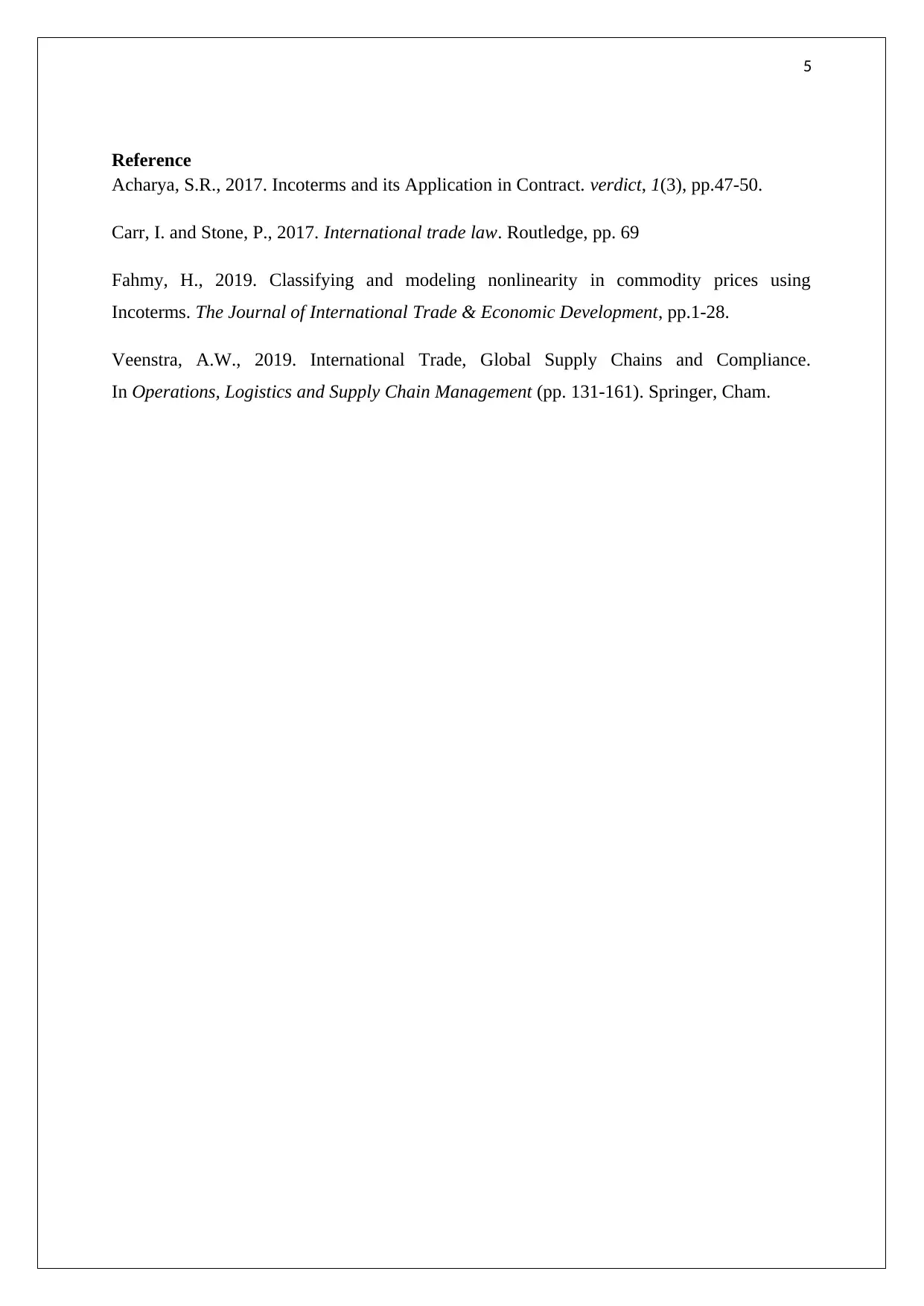
5
Reference
Acharya, S.R., 2017. Incoterms and its Application in Contract. verdict, 1(3), pp.47-50.
Carr, I. and Stone, P., 2017. International trade law. Routledge, pp. 69
Fahmy, H., 2019. Classifying and modeling nonlinearity in commodity prices using
Incoterms. The Journal of International Trade & Economic Development, pp.1-28.
Veenstra, A.W., 2019. International Trade, Global Supply Chains and Compliance.
In Operations, Logistics and Supply Chain Management (pp. 131-161). Springer, Cham.
Reference
Acharya, S.R., 2017. Incoterms and its Application in Contract. verdict, 1(3), pp.47-50.
Carr, I. and Stone, P., 2017. International trade law. Routledge, pp. 69
Fahmy, H., 2019. Classifying and modeling nonlinearity in commodity prices using
Incoterms. The Journal of International Trade & Economic Development, pp.1-28.
Veenstra, A.W., 2019. International Trade, Global Supply Chains and Compliance.
In Operations, Logistics and Supply Chain Management (pp. 131-161). Springer, Cham.
1 out of 5
Related Documents
Your All-in-One AI-Powered Toolkit for Academic Success.
+13062052269
info@desklib.com
Available 24*7 on WhatsApp / Email
![[object Object]](/_next/static/media/star-bottom.7253800d.svg)
Unlock your academic potential
Copyright © 2020–2026 A2Z Services. All Rights Reserved. Developed and managed by ZUCOL.





